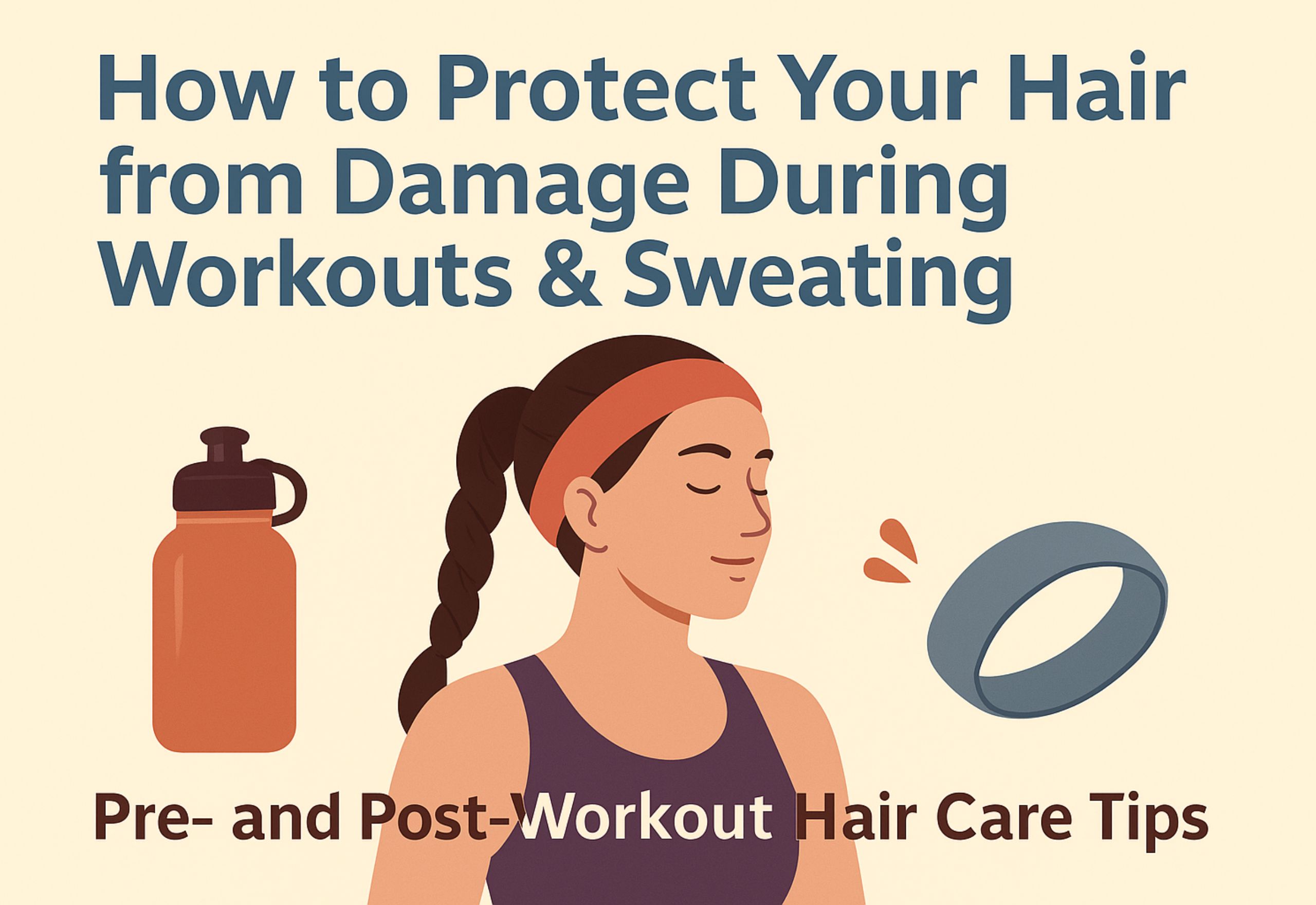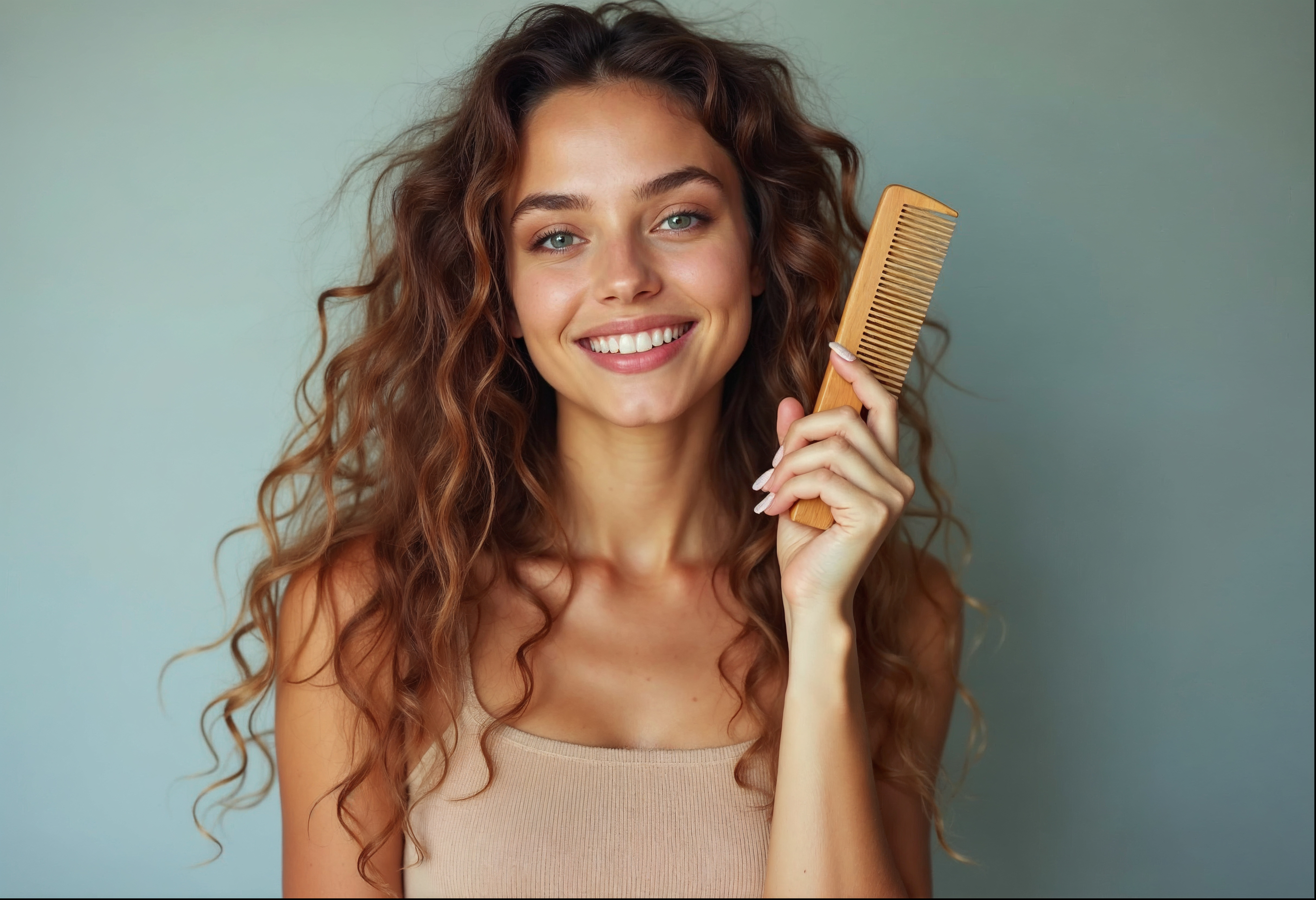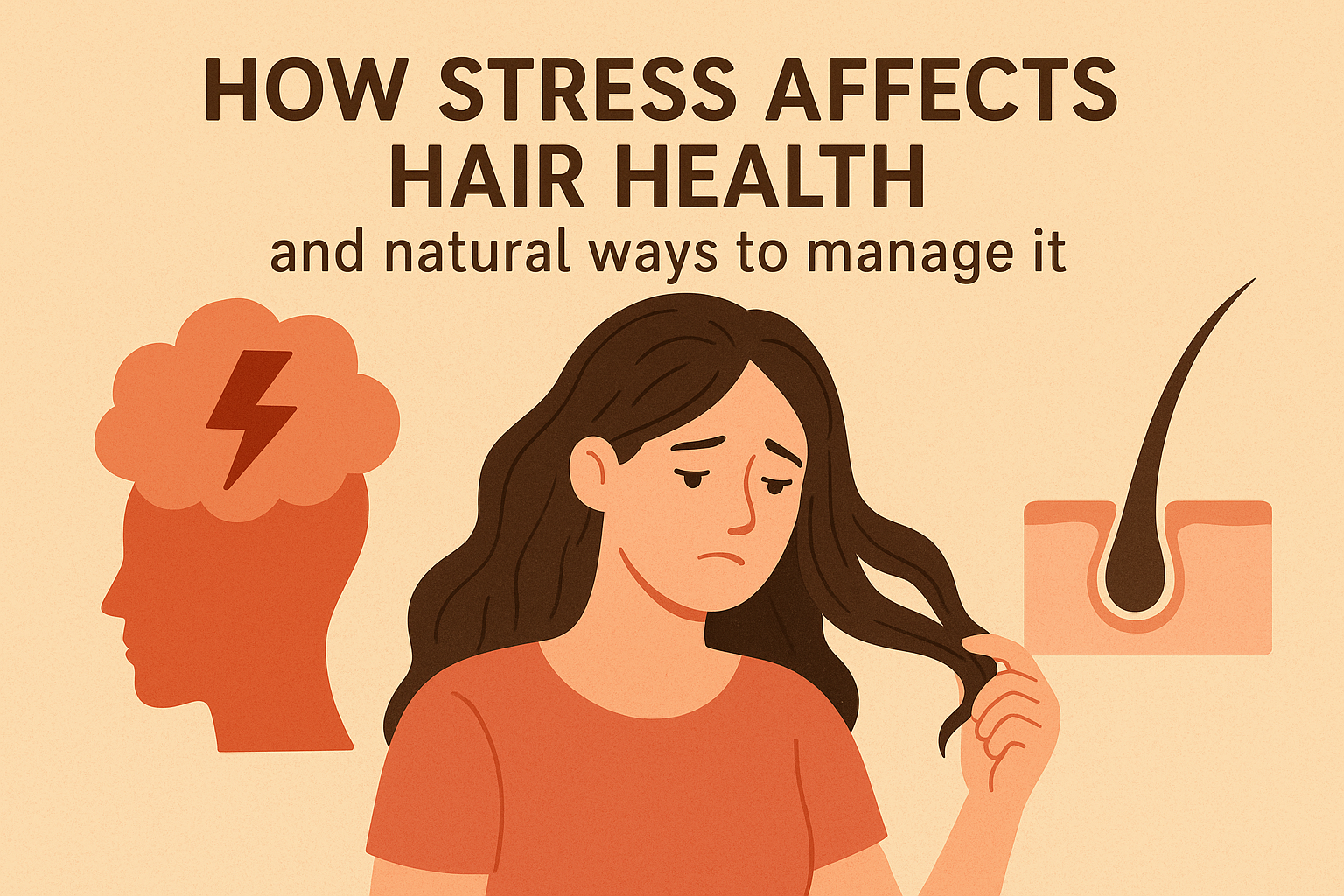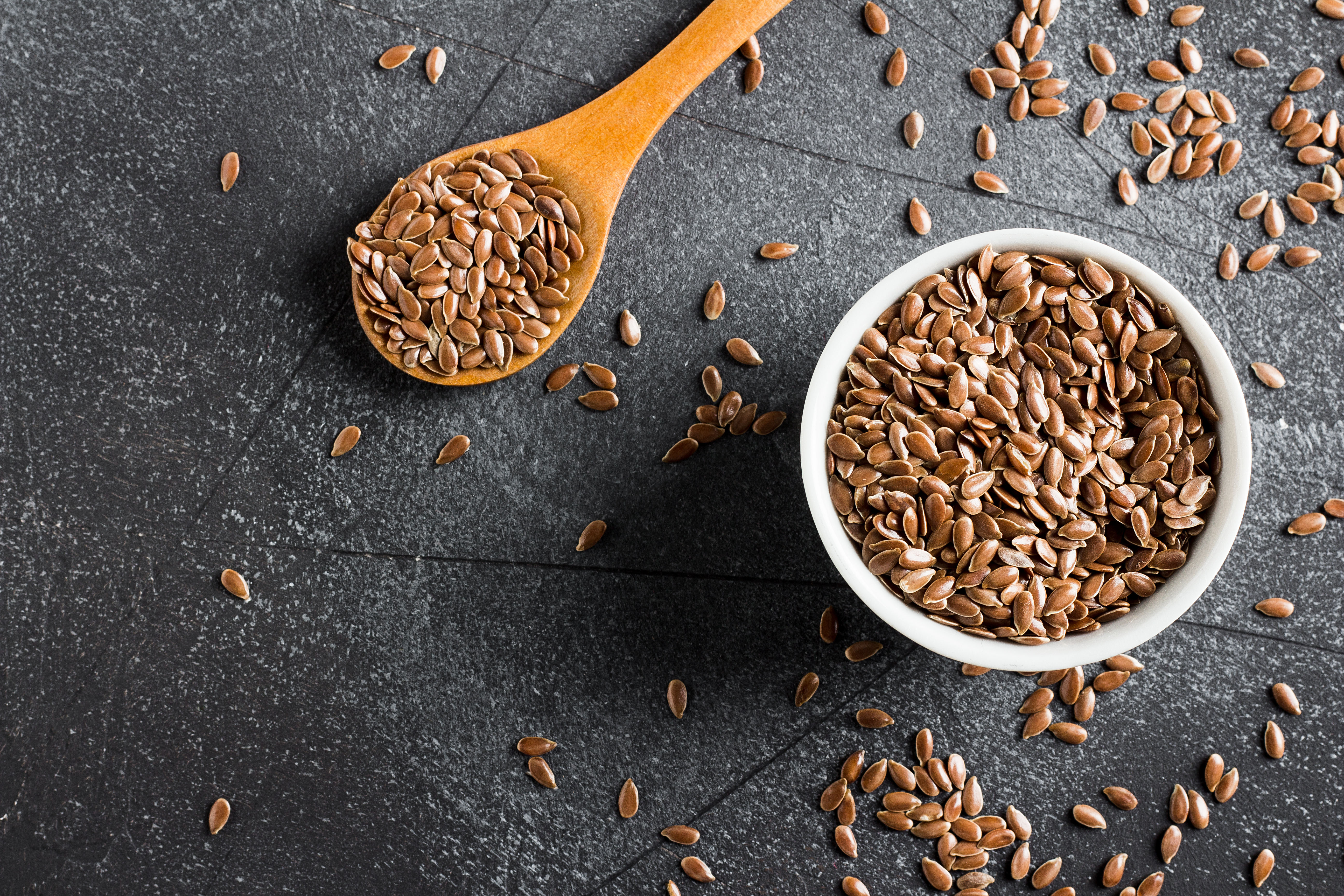Being active is great for our body and mind, but hair doesn’t always cooperate. Sweat, friction, and styling techniques used when working out can damage hair over time. No matter if you’re a runner, weightlifter, cyclist, or yoga instructor, sweat produced from your scalp has the potential to affect your hair health if not managed properly.
If you’ve been wondering how to protect hair from sweat during exercise while keeping your locks in great shape, there’s good news. By implementing purposeful pre-, during-, and post-workout habits, you can succeed in managing your hair during workouts while maintaining strength, shine, and hair growth.
In this blog, you’ll learn how sweat impacts your scalp and your strands, pre-workout protective strategies, easy workout hairstyles, and hair care tips after workout for proper recovery, post-workout hair care tips for proper recovery, plus how to effectively balance exercising and hair care.
How Sweat Affects Hair?
Sweat consists mainly of water, salts, and natural oils. While sweating is a perfectly normal and healthy mechanism to cool down our bodies, repeated sweating can be harmful for the scalp if it is not properly taken care of. Here’s why.
Salt buildups:
Because sweat is like most bodily fluids that contain salt, it can leave your hair feeling dry, brittle, and kind of rough. Sweat is a mixture of water, salts, and natural oils.
Scalp irritation:
When sweat is trapped under tight hairstyles or headgear, it can clog the hair follicles and irritate the skin.
Bacterial growth:
A salty, sweaty type of character is just the place for bacteria and fungus to thrive. This can lead to itchiness and dandruff.
Tangled hair:
The moisture of sweat will cause hair to swell, which can make hair more prone to becoming tangled. Even after your hair has dried, the added moisture will still create tangles because the swelling prevents your hair surface from lying flat. This swelling can also lead to breakage when washed or brushed.
Frequent sweating without the right sanitation can change the natural pH of the scalp, making the scalp susceptible to infections or chronic flaking. This is why understanding how to protect hair from sweat is so important for active people.
Pre-Workout Hair Protection Tips
You can avoid a lot of damage by doing some protection before you start exercising.
1. Use a Light Leave-In Conditioner
A light leave-in conditioner or hair serum will provide a thin layer to provide a “barrier” to prevent some of the drying impact of sweat and keep the hair smooth.
2. Use Natural Oils as Protection
When training, use a small amount of coconut oil or argan oil, or even a few drops of jojoba oil to protect hair against salt damage. Make sure to concentrate mostly on the mid-lengths and ends, avoiding the scalp area where possible, to prevent it from turning greasy.
3. Pick a Good Hairstyle
Tight hairstyles like ponytails and buns can cause breakage. So instead:
- Try a loose braid, which has less friction.
- Choose soft, fabric-covered hair ties and
- Avoid rubber bands, as they pull and can snap hair.
4. Wear a Sweat-Absorbing Headband
A sweat-absorbing headband made from moisture-wicking fabric can help absorb sweat before it gets to your hairline, so it is an easy answer to how to protect your hair from sweat when exercising!
If you’re working out outdoors using a headband, you may want to look for a headband with built-in UV protection to protect your scalp and your hair from the sun’s harmful rays.
Hairstyles That Reduce Sweat Damage
Your exercise style matters a lot more than you would think; the right one can make your hair healthier and easier to handle.
- Loose French braid: Keeps hair neat and minimises tangling
- Low bun: Reduces friction at the crown and lifts the hair off your neck (bonus if you wear a helmet)
- Pineapple updo (for your curls): Keeps curls lifted and away from humidity-prone areas
- Double braids: A great way to distribute nice tension and protect your ends.
Hair Care Practices During Workout
There are ways to be conscientious about your hair, even while you exercise:
- Use a soft towel to sweat instead of rubbing.
- Don’t adjust hairstyles repeatedly, as this can cause extra pulling.
- Don’t forget to hydrate, as that keeps both your body and hair fully functioning as well.
In a gym environment, do not allow your hair to touch shared surfaces of equipment, as sweat and bacteria transfer easily to your hair strands and scalp. These steps, combined with hair care tips after workout, can keep your strands stronger over time.
Hair Care Tips After a Workout
What you do after a workout is equally important as what you do before a workout. Here are the best hair care tips after a workout:
1. Rinse or Wash With a Gentle Shampoo
If you sweat a lot, rinse your scalp using lukewarm water to wash away the salt and bacteria. A gentle, sulphate-free shampoo can be used when needed, but not daily unless sweat has built up from very heavy sweating.
2. Use a Clarifying Shampoo Weekly
If you exercise on a regular basis, using a clarifying shampoo once a week can remove the build-up of sweat, oils from your scalp, and products used for styling.
3. Use a Moisturising Conditioner
Sweat dehydrates the hair, and a hydrating conditioner will be great for softening and smoothing the dehydration caused by sweating.
4. Detangle Gently
When your hair is damp, use a wide-tooth comb to detangle gently and prevent breakage. Work from the ends of the hair to the scalp by combing from the bottom to the top.
5. Air Dry Your Hair As Much As Possible
When your hair is clean, wait a bit before heat styling. Do recall that hair is more vulnerable when it’s wet.
If you must blow-dry your hair after working out, use only the cool setting or low heat option. Stand six inches away from your hair to minimize the heat damage aspect of blow-drying.
More Ways to Balance Hair Care and Fitness
- Schedule rest days for your body and your hair. Wear your hair out on those days and don’t tie it down.
- Be careful with your dry shampoo usage. Too much can build up on your scalp.
- If you sweat in your sleep, silk or satin pillowcases will create less friction on your sweaty hair while you sleep, so use these pillowcases.
- If you have colored hair, make sure to wear a UV protectant if you are exercising outdoors.
Following these hair care tips after workout regularly will help maintain shine and reduce breakage.
Hair Preservation Weekly Routine During Workout
Getting consistent results is better than perfection. Here is a simple plan:
Day 1- Cardio
- Pre: leave-in conditioner + headband
- Post: rinse, apply conditioner, air dry
Day 2- Strength
- Pre: loose braid with oil on ends
- Post: quick rinse or dry shampoo, if not much sweat
Day 3- Restorative yoga
- Pre: loose bun, no tie or no pull ties
- Post: light scalp massage to promote circulation
Day 4- Outdoors Run or Cycling
- Pre: put in a UV-protect spray if you’re in the sun + braid if you want to avoid tangles.
- Post: Rinse hair in cool water to help remove dirt and air pollution particles.
Day 5- Rest day hair nourishment
- Pre: no tie-wear hair down to relieve tension!
- Post: make a nourishing hair mask and let it sit for 20-30 minutes, rinse out.
For best results, track not only how your hair feels but also your whole scalp health, because a balanced scalp is key to long-term hair strength and growth.
Repeating this cycle is one of the most practical ways, how to protect hair from sweat during exercise while still training hard.
How to Track Your Hair’s Progress
While you cannot slow down the actual sweat, you can be on the lookout for signs of positive changes:
- Less dryness or brittleness after your workout
- Less tangling
- Less discomfort on your scalp (fewer itchy patches)
- Hair breaking less, week to week
Taking progress photos monthly can help as well to see gradual improvements.
Conclusion
Learning how to protect hair from sweat when exercising is ultimately about forming smaller, consistent practices. By preparing hair care tips after workout, applying hair care before exercise, picking more gentle hairstyles, and following practices in hair care after workouts, you can participate in your fitness routine without sacrificing hair health.
The sweat doesn’t have to mean damage; think of it as a sign your body is functioning well! When you take the right steps to protect your hair, as well as recovery steps for your hair, your hair can be strong, smooth, thick, and healthy, no matter how active you are.
By making these recommendations a part of your workout practices, you will find that healthy hair and regular exercise can totally coexist!
Related FAQs
Will sweating ruin my hair?
Not in and of itself, but over the course of time, salt build-ups can weaken your strands, leading to damage if not properly cleansed.
How often should I wash my hair after workouts?
It will depend on how much you sweat. If it is light sweat, you may just need a rinse, whereas heavier sweat may require washing every 2-3 sessions.
Can I work out with freshly washed hair?
Yes. A leave-in product, like a light spray or a braid, can help keep your hair from tangling.
Is dry shampoo useful to use after a workout?
Dry shampoo is valuable for absorbing excess oil and sweat; however, avoid overusing dry shampoo to prevent buildup on your scalp.
Is it possible for me to avoid sweat in my hair without washing my hair every day?
Yes. Simply continue to use a sweatband or braid your hair loosely and rinse your hair with water when you can to get rid of the salts, without overwashing your hair.
Do dry shampoos protect hair from sweat?
Yes, dry shampoos can absorb excess oil and moisture, but they’re not a replacement for washing. Use dry shampoo as an additional way in your routine when learning how to protect hair from sweat.
Does coconut oil protect hair from sweat?
Yes, using a small amount on your mid-lengths and ends before a workout is one way to protect hair from sweat while exercising naturally.
Is climate a factor in how I protect my hair from sweat?
Yes, in hotter climates, sweat is more abundant, so protecting your hair from sweat may become more frequent with lighter-weight products.
What’s the best gym routine for hair health?
Gently cleanse, condition, detangle, and air-dry hair when possible. Those are important long-range hair-care tips after the gym.
Can wearing a hat help protect hair from sweat while exercising?
Yes, if it is a breathable, moisture-wicking hat, wearing a hat can help protect hair from sweat while exercising, as it will absorb the moisture before it reaches the scalp and also protect the hair from sun exposure while exercising outdoors.



